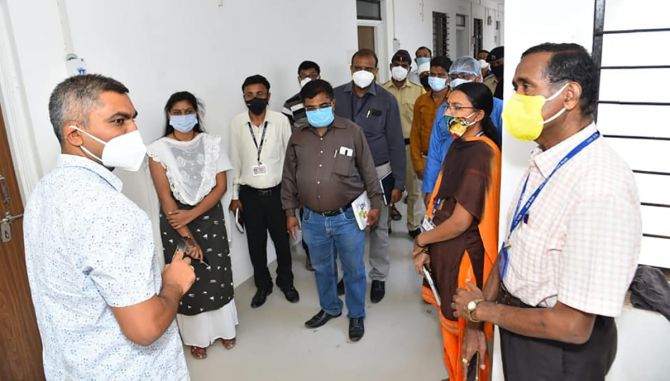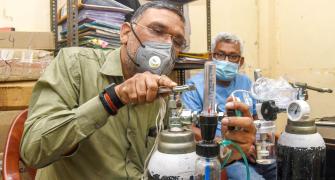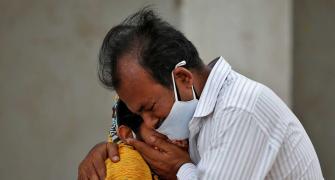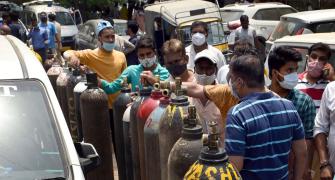Dr Rajendra Bharud has done what no other district collector in India could do as the pandemic ravaged the nation.
He not only made Nandurbar district oxygen surplus, but ensured that the supply of life-saving oxygen remained uninterrupted for patients -- something even Delhi and Mumbai hospitals have not achieved yet.

As a child studying in Nandurbar, a tribal-dominated district tucked into Maharashtra's northwest corner, Rajendra Bharud always wanted to become a doctor.
He had lost his father Bandu Bharud while his mother was pregnant and while growing up he understood very well the most important thing in life is life itself.
"There is nothing more important in life than saving someone else's life, and this I knew only a doctor could do. I was therefore determined to become a doctor since childhood," says Dr Rajendra Bharud, Nandurbar's district collector, who has overnight become a hero for the district's residents.
For Dr Bharud has done what no other district collector in India could do as the pandemic ravaged the nation.
He not only made Nandurbar district oxygen surplus, but ensured that the supply of life-saving oxygen remained uninterrupted for patients -- something even Delhi and Mumbai hospitals have not achieved yet.

Life was not an easy journey for Dr Bharud when he began his schooling.
His mother was illiterate and not financially well off but he was determined that he would not give up on his dreams.
Luckily for him, help came in as his teachers at the local zilla parishad school where he studied, found that Rajendra was an exceptionally good student, needed better education and recognised his potential.
"I am a product of this system. My teachers helped me in my education. I grew up in Nandurbar district and studied medicine in Mumbai. I am returning back to Maharashtra state what I got from the state. It is my duty as a doctor and as a collector to give back to society and I am doing it," Dr Bharud tells Syed Firdaus Ashraf/Rediff.com.
You must wondering what magic wand did Dr Bharud wave to achieve what most of his compatriots across India failed to do.
"I studied the history of the pandemic and the mutation of virus," he says.
When Indians were rejoicing by October 2020 that COVID-19 numbers were falling, Dr Bharud never let his guard down.
As a district collector, he worked with American companies with the help of the Maharashtra government to set up oxygen plants in Nandurbar.
"When the second wave hit America and Brazil I knew this is going to come back to our country, so I was preparing for my district to tackle the second wave. I used the PSA (Pressure Swing Adsorption) technology (external link) with which I could set up 5 PSA plants in Nandurbar, which can convert air into pure oxygen and you do not need liquids for it," says Dr Bharud.

Nandurbar has 1,290 oxygen beds and when this correspondent spoke with the genial collector on April 30, some 212 beds were vacant.
"Credit goes to the Maharashtra government which helped me set up these oxygen plants," says Dr Bharud, who did his medicine at Mumbai's G S Medical College, widely believed to be the city's finest medical institution, which is attached to the Brihan Mumbai Municipal Corporation-run KEM Hospital.
"To set up one plant costs Rs 85 lakh (Rs 8.5 million) (the Maharashtra government) and they provided all help. Moreover, oxygen is just one factor in saving lives. There are other factors like getting good doctors and nurses; they also helped to get us doctors and nurses who saved lives," adds Dr Bharud.
Can the Nandurbar model be replicated in other districts of our country? Dr Bharud says, "The problem is that the companies that set up oxygen plants are US-based. We need American technology. I got the job of setting up oxygen plants done between September 2020 and February 2021 when they too had the time. Right now there is huge demand and these companies are going all over the world."

On a positive note, he adds, "The central government as well as state governments have started the process of inviting more tenders and soon we will see many more oxygen plants."
"The other important point to note is to defeat COVID-19 you need to have a system in place where you isolate Covid patients and do testing of as many people as you can," Dr Bharud says.
"We have 27 ambulances in Nandurbar district. They work round the clock and get patients to isolation wards. By doing this we ensure that the patient is not spreading the virus," says Dr Bharud.
His team then goes to the patient's locality to trace and do swab tests of each and every individual to cross-check the spread of the virus.
"We had 1,200 cases showing for Nandurbar district, but right now we have only 240 active patients. We are hopeful the numbers will fall in the coming days," adds Dr Bharud.

Ask him if he misses being a practising doctor, Dr Bharud says, "I realised when I completed my MBBS in 2012 that to help more people, one needs to be a government officer. I gave my IAS exams and cleared it to become a government officer. My aim in becoming a doctor was to save lives. And now as a collector of Nandurbar district I am saving more lives. So I am happy being Nandurbar's collector."
"COVID-19 is a new virus to world. We do not know at this moment how the virus is going to mutate in the future. If it mutates dangerously we can see a third wave too by September 2021," Dr Bharud warns.
"We need to be on guard all the time to defeat the virus and save lives."









